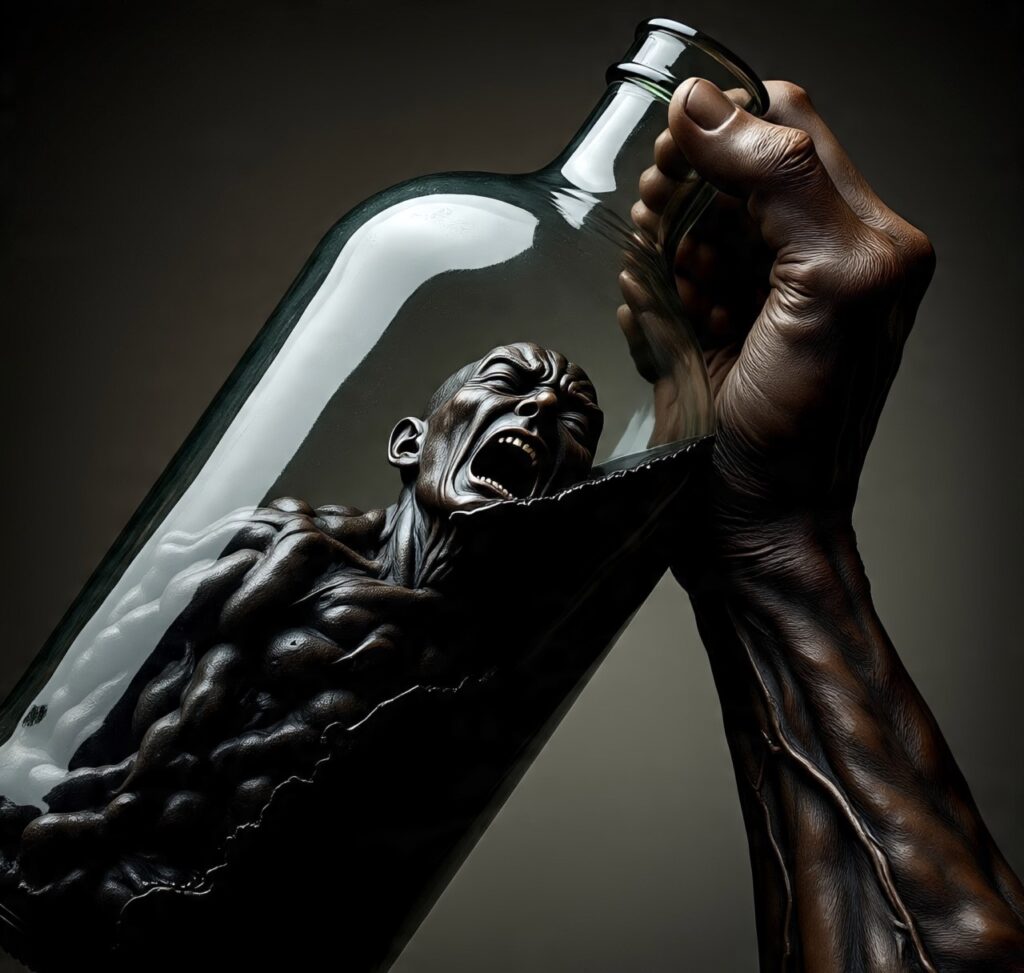I recently saw a picture of a sculpture that was created by Thomas Lerooy based on an old Irish saying: First the man takes the drink, then the drink takes the man, and that is the reason for today’s article. You know when most people think of addiction and you might be one of them, they picture extreme cases like shaking hands, lost jobs, broken families, but the truth is that alcohol does not need to shatter your life to shape it. It is not just about getting drunk; it is about the slow erosion of clarity, purpose, and personal power, one sip at a time.
Alcohol affects the brain’s reward system, flooding it with dopamine and convincing you that you are relaxing, socializing, or coping more effectively, but another truth is that over time, the brain rewires itself to crave that shortcut to comfort, weakening your natural ability to deal with stress, joy, or sadness on your own. The drink starts as a choice, but again, over time, it becomes the one making the choices.
In small amounts, it seems harmless, but even moderate drinking can impair your judgment, and alter your emotional resilience. It trains you to reach for relief instead of resolve and while the change may be invisible at first, it is a quiet surrender of your mental and spiritual authority.
One Sip at a Time is a Gateway
Today’s culture in my opinion sells us a lie: “Drink responsibly,” as if the presence of self-control in one moment guarantees freedom in the next. But real responsibility is not measured by how well you manage a substance; it is measured by your willingness to reject it when it compromises your values, your clarity, and your convictions.
Responsibility is not about consumption; it is very very much about conviction, and true conviction does not flirt with compromise; it draws a line and defends it, even when everyone else crosses it.
The problem is, alcohol no longer carries a warning label in our culture; it carries a social stamp of approval. It is everywhere: Church weddings, leadership retreats, weekend barbecues, after-hours meetings, even Christian homes. Drinking has been rebranded as a harmless social habit, a symbol of sophistication, adulthood, and cultural ease.
But what if that image is the real deception? What if true maturity is not about indulging with “boundaries,” but about resisting what gradually weakens those very boundaries?
What if true maturity is the ability to say no to what chips away at your awareness, your discipline, your witness, and your spiritual connection with God?
For some people, the slide is sudden: A stressful season, a breakup, a celebration gone a little too far, one drink turns into many, and dependency sets in fast.
But for some people, the erosion is quieter, subtle, years in the making. A glass of wine to relax after work, a beer with the guys on Friday night, a toast at a family event. No big deal right? Not until you realize it is no longer optional, until it becomes part of your identity: First The man takes the drink and slowly, the drink starts to take the man.

It begins as social lubrication, but ends in mental and spiritual dullness; it starts as a treat, but becomes a crutch. It is “just one,” until that “one” is no longer something you can joyfully walk away from.
My dearest readers, here is the hard truth: You do not need to be drunk to be compromised; you just need to be dependent. If you find yourself needing the drink to relax, to loosen up, to socialize, to escape, then the drink is no longer serving you, you are serving it.
The gateway is not built with binge drinking and wild nights; it is built one casual sip at a time, until what was once a choice becomes a chain.
This is why we must be vigilant, not legalistic, but clear-eyed. Not judgmental, but discerning, because what is socially acceptable can still be mentally and spiritually corrosive.
Casual drinking is not always immediately harmless, but it is certainly a slow exchange of clarity for comfort, conviction for culture, control for compromise, and every sip, no matter how civilized, asks the same quiet question: Who is really in charge?
Saying ‘No’ to Alcohol is Saying ‘Yes’ to Clarity, Conviction, and Control
There is a reason Scripture does not merely warn us about drunkenness; it calls us to be sober-minded.
Be sober, be vigilant; because your adversary the devil walks about like a roaring lion, seeking whom he may devour.
1 Peter 5:8 NKJV
That is a higher standard; that is not just a rule about how much you drink; it is a command to live awake, alert, and ready. The Christian life is not simply about avoiding obvious sin; it is about guarding the gates of your mind and spirit with total vigilance; it is a life of edification.
Sobriety, in the biblical sense, is not about being boring or buttoned-up; it is about spiritual readiness. It is about being tuned in to truth, sensitive to conviction, and clear-eyed about what is at stake in your daily decisions. Alcohol, even in so-called “moderation,” works directly against that clarity; it does not just cloud your mind, it weakens your spirit; it dulls your edge; it blunts your convictions.
Alcohol does not need to ruin your life to reduce your effectiveness; it does not need to crash your car or end your marriage to steal something from you, all it needs to do is make you comfortable enough to stop paying attention, because when your mind grows foggy, so does your conscience.
When the heart becomes relaxed by artificial peace, discernment is slowly replaced by indifference. What once would have convicted you, now barely registers. What you once would have avoided, you now entertain.
Alcohol’s danger is not always in what it does to you immediately, but in what it slowly takes from you:
- Your mental clarity.
- The edge of your conviction.
- The sharpness of your purpose.
- The intimacy of your connection with God.
My dearest readers: Saying no to alcohol is not about fear; it is not about pride and it is not about religious legalism.
It is very very much about protecting the sacred space where wisdom grows and conviction is born. It is about defending your spiritual mental space from anything that mutes the voice of God or softens the weight of your calling.
When you say no to alcohol, you are not rejecting pleasure; you are choosing power; you are choosing self-mastery over self-medication. You are choosing full emotional and spiritual presence over chemical escapism; you are choosing clarity over compromise.
And that clarity is where strength lives; that is where your decisions become aligned with your values, and that is where your life begins to reflect who you were truly created to be, sound in mind and sound in heart.
True freedom does not come in a bottle; it comes in being fully awake; fully present, and fully ruled by the Spirit and mental clarity, not substances.
So no, it is not just about avoiding drunkenness; it is about choosing a lifestyle that refuses to let anything, even one glass blur the purpose God has placed in you.
Clarity is power! Sobriety is strength!
Read Also: Guard Your Heart Above All Else
Read Also: The Pressure Reveals The Person: Proverbs 24:10
Read Also: The Dilemma: When Your Principles Collide and Values Are Tested
Conclusion
We live in a culture that glamorizes, praises and supports what God calls us to resist, but those who desire purpose, purity, and power in their lives must reject what subtly steals those very things. Alcohol is not neutral; it is a master in disguise.
Do not wait until it takes more than it gave; do not wait until you have lost the fight to realize you started it when you took that first drink.
Say no! Not because you are weak, but because you have decided to be strong.





